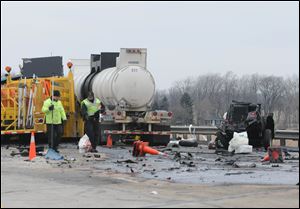
OHIO HIGHWAY MAINTENANCE CREWS
New law seeks to keep road employees safe
Fatal Fremont crash in ’12 spurred bill
12/20/2013
Emergency personnel investigate the scene of a fatal accident on the Ohio Turnpike north of Fremont on Jan 24, 2012. The State Highway Patrol says a tractor-trailer veered into a work zone on the turnpike, killing one worker and seriously injuring two others and the truck driver.
COLUMBUS — Nearly two years after an Ohio Turnpike worker from Perrysburg was killed when a tractor-trailer rig slammed into a work crew, all motorists will be required to move over or slow down to accommodate such vehicles.
Senate Bill 137, sponsored by Sen. Tom Patton (R., Strongsville), took effect immediately Thursday upon Gov. John Kasich’s signature, but it came with a 90-day grace period in which violators will receive warnings rather than citations. After that, drivers could be cited with a minor misdemeanor with the penalty escalating if the driver has had multiple infractions in the last year.
It’s still unclear what caused trucker Edward Mills of Doylestown, Ohio, to plow into a turnpike road crew near Fremont on Jan. 24, 2012, killing Forest “John” Fletcher, a 53-year-old father of three. Two other crew members — James Roudebush of Millbury, Ohio, and Anthony J. Stout of Clyde, Ohio — were seriously injured and still have not returned to work.
Mr. Fletcher’s widow, Amy, doesn’t know whether the new law would have made a difference in her husband’s case, but she told The Blade she is grateful to lawmakers’ attempts to make roads safer for maintenance crews.
“It’s a start,” she said. “There are many things that need to be done. Driver attention is one of the most important issues to keep them safe out there. It doesn’t matter how many flashing lights, cones, barrels, or miles of warning you give drivers, if the driver isn’t paying attention, the risk still exists. There is more to be done to respect workers.”
Mr. Mills pleaded guilty to a first-degree misdemeanor vehicular homicide charge in Sandusky County, was sentenced to 60 days in jail, and lost his commercial driver’s license for five years.
At the time, he said he didn’t know what had happened, so there’s no indication whether Senate Bill 137 would have made a difference if it had been law at the time.
Just as they do now with police cars, emergency vehicles, and tow trucks, drivers on a highway would be expected to pull into an adjacent lane to give stationary maintenance vehicles with flashing, oscillating, or rotating lights a wide berth. If such a move isn’t wise because of traffic or safety issues, the driver should slow his vehicle until passing the road crew.
“They are heroes on the highway, and they need the same respect that is granted to police and firefighters,” Ms. Fletcher said. “I’d like to see more done to protect them. … I know my husband would have wanted that.”
The law, supported by the Ohio Department of Transportation and turnpike commission, considers a highway maintenance vehicle to include snow plows, traffic lane stripers, road sweepers, mowers, paving vehicles, and Public Utility Commission inspection vehicles.
An estimated 600 accidents involving such vehicles have occurred since 2008. In April, ODOT employee Lee Rizor, 27, a father of two, was killed on I-71 in Delaware County when a truck went off the road.
“Each morning when our workers leave their husbands and wives and head off for what can be very dangerous jobs along Ohio highways and the turnpike, the expectation is they will return home at the end of the work day,” ODOT spokesman Steve Faulkner said. “This bill will help them do that. We’ve seen instances where that hasn’t happened.”
Mr. Kasich, who signed the bill into law, was himself pulled over and cited in 2008 by a Columbus police officer after he failed to give wide berth to a stopped emergency vehicle as Ohio law required.
It was this incident that prompted Mr. Kasich soon after becoming governor in 2011 to call the police officer an “idiot” while attempting to make a point to state employees about the importance of being customer friendly. He later apologized to the officer after a video of his comment went viral.
Among 11 other bills that Mr. Kasich signed Thursday were:
● Senate Bill 200, requiring certain state agencies to share driver’s license, death certificate, criminal, address, and other information with the secretary of state’s office for cross-referencing with voter registration data to flag potential problems.
● Senate Bill 23, designed to fill a gap in Ohio law and give an estimated 400,000 Ohioans adopted between 1964 and 1996 access to their original birth certificates and family medical histories through the Department of Health.
Biological parents may place a form in the adoption file indicating whether they want to be contacted by those they put up for adoption. The law, taking effect in 15 months, would allow birth parents to have their names redacted from the birth certificate, if they wish.
Contact Jim Provance at:
jprovance@theblade.com
or 614-221-0496.